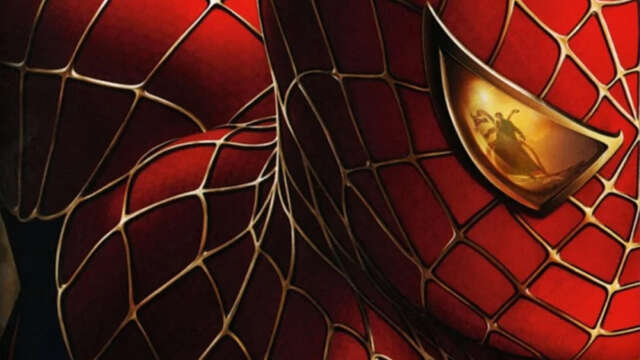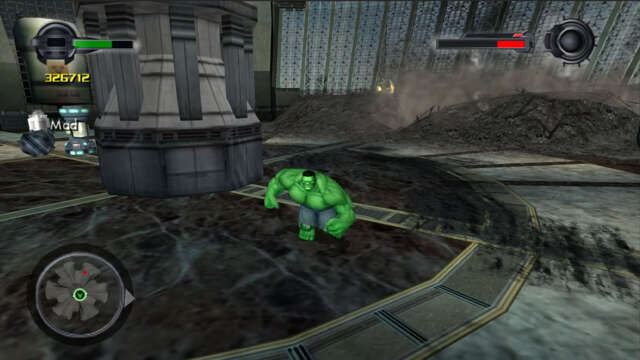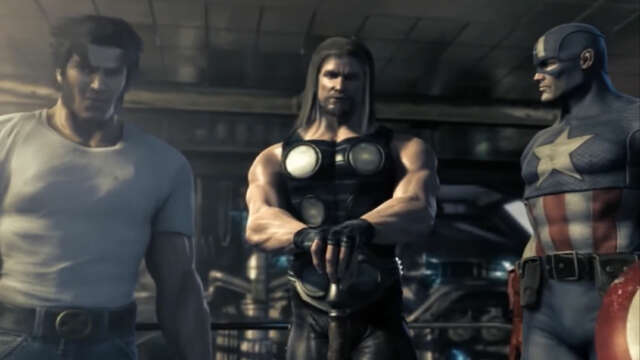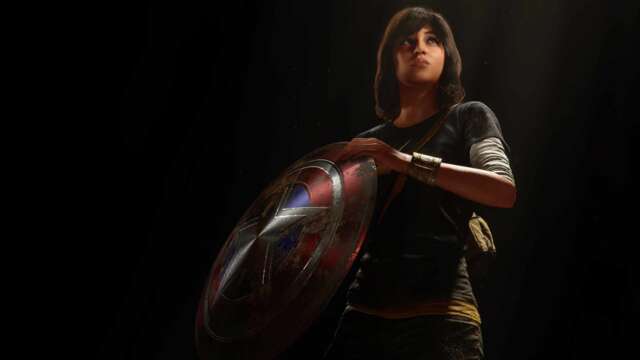
Marvel comics has been making memorable and iconic characters since it first started printing comics more than 80 years ago. The publisher behind heroes like Spider-Man, Captain America, and the Fantastic Four is a household name, in part because of its steady stream of mega-blockbuster movies that all take place in a massive, interconnected world. The Marvel Cinematic Universe, or MCU, has made many of its characters mainstream in a way they never were before. The acquisition by Disney in 2009 only amplified its popularity and scope, as the entertainment mega-brand folds Marvel's heroes into its other iconic properties like Disney animation, Pixar, and Star Wars.
Marvel has been lending its name out for video game adaptations for much longer, racking up an impressive list of classic games from long before everyone identified Robert Downey Jr. as Tony Stark. From beat-em-ups to fighters to puzzle games and pinball, Marvel heroes have appeared in just about every genre and type of video game. Here are 20 of the best Marvel games, spanning all the way from early arcade games to modern AAA productions.
For even more on Marvel, check out our definitive ranking of all 38 MCU superheroes. And for more superheroic action, read our picks for the best superhero movies of all time.
Captain America and the Avengers arcade (1991)

One of the earliest of Marvel's beat-'em-ups brought together the Avengers long before they were a household name. The arcade game, later ported to Super NES and Genesis, featured Captain America, Iron Man, Hawkeye, and Vision as they battled against a range of villains like The Mandarin, Juggernaut, and Ultron, before finally confronting the arch-fascist Red Skull. One nice feature was how it paid homage to some lesser-known Marvel heroes with assist cameos from characters like Wonder Man and Namor.
Spider-Man: The Video Game arcade (1991)

While this beat-'em-up arcade game from Sega boasts Spider-Man as its marquee character, it's much more of a Spidey family game than you might expect. The four-player arcade let you select from the wallcrawler himself along with Black Cat, Sub-Mariner, and Hawkeye. This introduced some variety to their move sets, as Spidey and Black Cat were more melee-focused while Hawkeye and Sub-Mariner relied on ranged attacks. It even made use of Spider-Man's web-slinging ability, in a way, by letting him swing above the battlefield to close a gap or get out of a jam.
X-Men arcade (1992)

Who hasn't lost a few quarters (or dollars, or tens of dollars) to this arcade classic? This 1992 arcade game was a massive hit, and the deluxe version of the cabinet let you play with six characters at once across two screens. The roster included all of your favorite characters and also Dazzler for some reason, each using their own iconic power sets and screen-filling special abilities. In an era before pre-rendered cutscenes, this big beautiful sprite artwork was as cinematic as it got.
The Punisher arcade (1993)

Perhaps the grimmest of Marvel's antiheroes, The Punisher is known for meting out brutal vengeance on anyone he judges as deserving. That made him a perfect candidate for a beat-'em-up arcade cabinet in 1993, when Sega put out this classic. You could play as Frank Castle, aka The Punisher, or '90s-era Nick Fury as the second player, as you punished street thugs and supercriminals alike. True to its comic roots this was an especially violent game, even by beat-'em-up standards, as Frank and Nick would often use firearms in the course of combat.
Spider-Man and Venom: Maximum Carnage (1994)

At the height of the '90s comics boom, readers couldn't get enough brooding heroes, which meant that some characters originally envisioned as villains made the jump to dark antihero. That was the case for Venom, a Spider-Man villain that became, essentially, a more badass version of Spidey himself. But they still needed someone to fight so the even darker character Carnage was born. Just two years later the storyline was adapted into this brawler that let you pick from the agile Spidey and the bruiser Venom to take on Carnage, along with other famous villains like Shriek and Demogoblin. Brawlers were a dime a dozen in the mid-90s but this one stood out thanks to its solid encounter design and timely comic references.
Marvel vs Capcom (1996)

At the height of Capcom's fighting game domination came one of the best fighting series of all time, thanks to a mash-up of two very different franchises. Capcom combined the roster of comics royalty with its own well-known fighter characters, primarily from the wildly popular Street Fighter series. The result was a faster-paced game with wild screen-filling effects and a unique tag-team mechanic that added an extra layer of strategy. Though the first game in 1996 made the biggest mark, the series is best known for the stellar MvC2 in 2000. That game's expanded roster and refined mechanics made it a mainstay in the fighting circuit, and some fighter fans still swear by it to this day.
Spider-Man 2 (2004)

Spidey's web-swinging became such a mainstay in the many Spider-Man games Activision put out throughout the 2000s that it's easy to forget a time when it was novel. That arrival point was Spider-Man 2, the first game to actually make you feel like Spider-Man by letting you sling webs through a realistic (for the PS2) depiction of New York City. Later iterations of the character would improve on this aspect in almost every way, but the original earned a special place in our hearts by finally capturing the feeling of being Spider-Man.
Hulk Ultimate Destruction (2005)

Various games have featured the Hulk, but this 2005 game was the first to understand that what we really wanted to do as Hulk was simple: smash. An open world design did wonders for the character, since it gave him an unprecedented level of freedom to wreck the place. You're a hero doing heroic things, sure, but your surroundings are going to get decimated in the process. Unlike Spider-Man 2, though, this game that absolutely nailed its title character never got a sequel, leading to several years of fans pining for more ultimate destruction.
Marvel Ultimate Alliance (2006)

Years before the MCU started mashing together heroes like action figures, Marvel Ultimate Alliance let you play with all your favorite heroes to build your dream team comp. Marvel Ultimate Alliance and its sequel, MUA2, are remembered for their unique isometric gameplay featuring four characters at a time, letting you build a team and swap between favorites like Spider-Man, Wolverine, Daredevil, and Captain America on a dime. They even featured some more obscure characters, like Black Panther long before he became a household name thanks to the MCU film. Marvel Ultimate Alliance 3 was a Switch exclusive that got a good-not-great reception, but it still scratched the itch.
Wolverine (2009)

The Wolverine Origins movies were not great, but this game tie-in actually was. Raven Software took liberties with the movie script and combined it with comics lore to create a semi-original story for the hack-and-slash featuring everyone's favorite Canadian superhero. The marquee feature was a graphic depiction of Wolverine's mutant healing factor, which let you see the muscle and sinew rebuild itself after he got into a particularly ugly scrape. In effect it was just a flashy way to show auto-healing, but seeing it on Wolverine just made it so cool. Besides that, it was a decently fleshed-out game in general, with a full skill tree and good variety to the enemy encounters.
Marvel Pinball (2010)

Not long ago, mega-successful franchises would get physical pinball tables manufactured and distributed to arcades and bars across the country. Pinball is more of a niche hobby now, but Zen Pinball has kept the trend going with a wide array of virtual pinball tables, which often tie into popular movies and TV shows. Marvel Pinball is a hub for these inventive table designs, starting with a few heroes like Spider-Man and Wolverine and eventually expanding with DLC to include comic arcs like World War Hulk and the Infinity Gauntlet.
Spider-Man: Shattered Dimensions (2010)

Activision and Beenox produced a series of Spider-Man games to mixed results, but Shattered Dimensions had the creative hook of bringing together the Spider-Man multiverse. Rather than playing as a single iteration of Spidey, you got to web-sling as both the Amazing Spider-Man and Ultimate versions, along with 2099 and Spider-Man Noir. That gave it a nice variety of tones and scenarios that had been lacking from other Spider-Man games. If the pitch sounds familiar, that's because it went on to inspire the Spider-Verse comic books, which in turn were adapted into the hit movie, Spider-Man: Into the Spider-Verse.
Marvel Puzzle Quest (2013)

The Puzzle Quest series had humble beginnings as a somewhat generic swords-and-sorcery epic, albeit with the clever hook of adding RPG mechanics to a match-3 game. It's spun off in several directions since then, but Marvel Puzzle Quest might be the most successful. The live service mobile game has continuously added new heroes and scenarios for players to tackle as they expand their roster of heroes, using the same tried-and-true match-3. While it's a free-to-play game, players agree it's a relatively generous one that allows you lots of play time without having to pay a cent.
Lego Marvel Super Heroes (2013)

The Lego series of games lends itself to properties with plenty of playable characters and lots of unique environments to explore, so of course Marvel was a perfect fit. Lego Marvel Super Heroes and its sequel both use the enormous roster of iconic Marvel characters to let you team up with Captain America, Star-Lord, Spider-Gwen, and more. Like many Lego games it sorts its roster of heroes into different skill sets for puzzle-solving and combat challenges, so you can revisit stages with newly unlocked characters to uncover hidden secrets.
Guardians of the Galaxy: A Telltale Series (2017)

In the waning days of Telltale, the developer was putting out games based on just about every pop culture property you could think of. Guardians of the Galaxy had grown in popularity thanks to two successful films, and the bickering squabbles of the Guardians made it a good match for Telltale's style of storytelling. As Peter you had to make some tough choices that might anger Rocket or Gamora, and it all led to a galaxy-saving conclusion that nevertheless presented you with one more difficult decision. Following the lead of James Gunn's musically reverent films, each episode was named after a famous classic rock song.
Marvel's Spdier-Man (2018)

Insomniac's take on the iconic wall-crawler followed years of middling games, and revitalized the hero for a new generation of consoles and gamers. The new Spider-Man took what was great about many of the classics like Spider-Man 2--namely the thrill of web-slinging your way across a realistic Manhattan--and added more fluid combat inspired by the Batman Arkham series and a filmic original story scaffolded by gorgeous cutscenes. This version of Spider-Man--recognizable by a suit unlike any of the character's hundreds of other incarnations--has earned his own place in Marvel lore. Insomniac's well-drawn Spidey universe will continue in Marvel's Spider-Man 2.
Iron Man VR (2020)

Lots of video games are about living out your wildest power fantasies, but VR can take it to the next level by letting you actually feel like you're flying high above the clouds. That was the concept behind Iron Man VR, a PSVR exclusive that put you behind the helmet of one of Marvel's most iconic heroes. The game let you explore freely, and critics praised its naturalistic flying mechanics--no easy feat in a VR game.
Marvel's Avengers (2020)

Marvel's Avengers has become known mostly for its divisive ongoing live service, as some players keep up with it regularly and others found it too exhausting to run the treadmill. Whatever you might feel about that aspect of the experience, the package as a whole is impressive. Crystal Dynamics made a full-fledged campaign starring relative newcomer superhero Kamala Khan, aka Ms. Marvel. This faithful adaptation of her comic book power set was a well-told superhero coming-of-age story and a great bit of Muslim representation to boot. The powers of the rest of the heroes are nicely differentiated, whether you prefer a bruiser like Hulk or a ranged attacker like Iron Man. This was a game that had an uphill battle to convince a skeptical public, and it pulled it off--mostly.
Marvel's Spider-Man: Miles Morales (2020)

Insomniac's Spider-Man teased the arrival of fan-favorite character Miles Morales, who is a friendly neighborhood Spider-Man of his own. This spin-off game helped usher in the PS5 by giving Miles his own adventure, but it was more than just a palette swap for Miles' slick black suit. Morales' Spider-Man got his own full-fledged story complete with his own set of villains, having to learn the ropes of being a Spidey and protect the city while Peter was out of town. It also takes place in winter time, giving the whole affair a nice seasonal effect.
Marvel's Guardians of the Galaxy (2021)

After the mixed reception to Marvel's Avengers, expectations were tempered for Square Enix to produce another Marvel game. Similar to Avengers, Guardians of the Galaxy from Eidos-Montreal was its own Guardians universe, distinct from the MCU, and told an original story more inspired by the comic books. But this version of the Guardians actually had a stellar story with tons of heart, following the found family of space rejects as they grappled with a massive cult creeping its way across the cosmos. The combat had you squarely in the role of the group's leader, Peter Quill aka Star-Lord, as he commands the guardians and even gives pep talks.

No comments:
Post a Comment
Note: Only a member of this blog may post a comment.